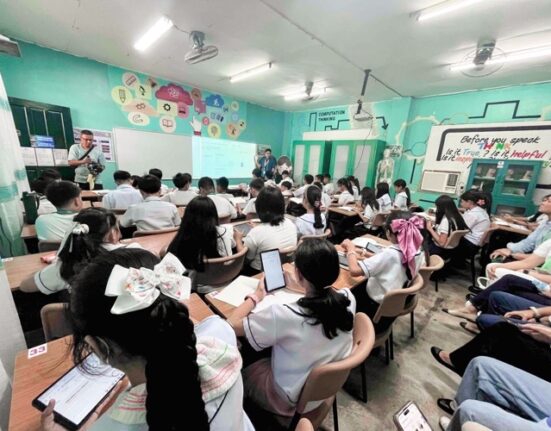THE Department of Education (DepEd) is preparing a new curriculum that will tackle issues in the West Philippines (WPS) for grade school students in the next academic year.
In a press conference in Camarines Sur, Commodore Jay Tarriela of the Philippine Coast Guard (PCG) said that this curriculum adjustment, a collaboration between the DepEd and the National Task Force for the WPS (NTF-WPS), is for students in Grades 4, 6, and 10.
For Tarriela, the topic of the WPS is “very important information” that every Filipino, particularly the youth, needs to know and understand, including its location and the objective of the Philippine government’s transparency efforts.
“‘Pag pinag-usapan natin ang West Philippine Sea, kailangan maintindihan ng ating kabataang Pilipino na this represents our own national identity,” he said.
“I always emphasize as well that the issue in the West Philippine Sea is intergenerational, and because of that, we need our youth to understand what we’re fighting for and why we’re fighting for it,” he added.
Comic book
Tarriela also presented to the press “The Stories of Teacher Jun,” a comic book produced by the NTF-WPS, which will serve as an official reference for the DepEd in teaching the elementary students about the WPS.
He added the University of the Philippines (UP), the Department of Justice, the Department of Foreign Affairs, the National Security Council, Former Supreme Court Senior Associate Justice Antonio Carpio, and Attorney Jay Batongbakal helped the NTF-WPS in conceptualizing the 40-page comic book.
Launched in February, “The Stories of Teacher Jun” follows Teacher Jun and his students as they explore maritime zones and international laws, highlighting the landmark 2016 arbitration ruling that affirmed the country’s sovereign rights in the WPS.
The WPS refers to the maritime areas on the western side of the Philippine archipelago, which are located within the country’s 200-nautical-mile exclusive economic zone (EEZ).
The 2016 Permanent Court of Arbitration (PCA) ruling nullified China’s so-called nine-dash, now 10-dash-line, stressing that it had no legal basis under international law. However, Beijing still rejects Manila’s arbitral victory.
On Thursday, the Philippine government said it would file a diplomatic protest against China for greenlighting the establishment of a nature reserve in Bajo De Masinloc. It urged China to respect the Philippines’ sovereignty and jurisdiction over Bajo de Masinloc and comply with its obligations under international law.
How useful was this post?
Click on a star to rate it!
Average rating 0 / 5. Vote count: 0
No votes so far! Be the first to rate this post.
We are sorry that this post was not useful for you!
Let us improve this post!
Tell us how we can improve this post?







